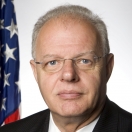
The activities conducted by law enforcement agencies, such as AFOSI, FBI, Army CID, NCIS and Secret Service, alter the cost-benefit calculation of cyber criminals and create a deterrence mechanism. Each successful investigation, prosecution, and conviction demonstrates the real-world costs for conducting seemingly anonymous cyber crimes. Naturally, the global nature of the Internet introduces challenges to this process, but we’ve been remarkably successful in cooperating with international partners to identify and detain suspects in other countries. By increasing the cost and reducing the benefits for malicious actors, we can eliminate, delay, or shift their activity.
While I was attending the 32nd Air Force Office of Special Investigations (AFOSI) Annual Awards Banquet in early March I was reflecting on the outstanding capabilities we’ve developed for combating cyber threats. For those that don’t know, AFOSI provides investigative service to commanders, primarily criminal investigations and counterintelligence services. They are a tremendous resource that investigates cyber crimes that affect the Department of Defense, as well as offering defensive support against cyber threats to our military networks.
These award ceremonies are a refreshing look at the areas where we excel. It is easy to get bogged down in the day-to-day problems of handling the cyber threats we face. We should not forget that strides are being made in cybersecurity, as demonstrated by several of the award winners. More importantly by highlighting their success, we can learn from their efforts and share their experiences.
The award winners demonstrated outstanding accomplishments across multiple mission requirements. From addressing cyber intrusions to modernizing training programs to sharing information with international partners, their achievements reflect the multi-faceted problems we have to confront as we increase our reliance on digital infrastructure.
Once again, congratulations to those that were recognized for their contributions. There are significant challenges ahead, but these award winners and all those who diligently work in this area across the Federal, State, and local government prove we have the capability to make cyberspace more secure.
Howard A. Schmidt is the Cybersecurity Coordinator and Special Assistant to the President.


